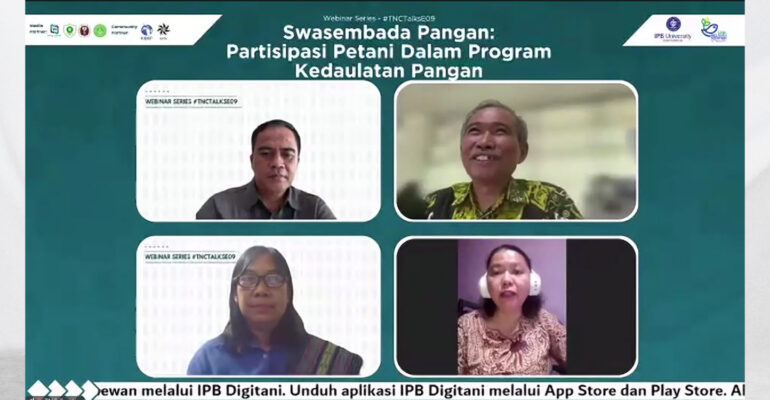IPB University Expert: 99 Percent of Indonesia’s Food Production is People’s Agriculture

Expert and Dean of the Faculty of Agriculture of IPB University, Prof Suryo Wiyono, said that 99 percent of food production in Indonesia comes from smallholder agriculture. Therefore, he emphasized that the success of the food self-sufficiency program is highly dependent on the active participation of farmers.
“Farmer participation is very important for the success of various programs related to food sovereignty by paying attention to three main aspects, namely success, sustainability and resilience,” he said in a webinar organized by the Tani and Nelayan Center (TNC) IPB University recently.
Prof Suryo emphasized that agricultural policies must be more in favor of farmers and not just stuck in bureaucracy that hampers innovation in the field. He invited stakeholders to synergize in creating a more independent and sustainable agricultural system.
In line with that, IPB University’s Vice Rector for Research, Innovation, and Agromaritime Development, Prof Ernan Rustiadi, said that farmers in Indonesia are the main actors in the food production system in Indonesia, in contrast to other countries that are more dependent on large-scale agribusiness.
“Therefore, farmers must act as subjects in food policy, not just as objects,” he said. He also emphasized the importance of providing fair returns to farmers so that national food security is maintained.
Said Abdullah, SP, MSi as the moderator of this webinar emphasized that food self-sufficiency is not only about increasing production, but also includes aspects of the sovereignty of small farmers who are the backbone of national food security.
“Of the 28 million farming families in Indonesia, around 14 million of them are small-scale farmers. Therefore, policies that favor small farmers are key in realizing sustainable food self-sufficiency,” he said.
In this #TNCTalksE09 webinar, Prof Hermanu Triwidodo as Head of TNC IPB University also emphasized the importance of food diversification by emphasizing that food self-sufficiency does not only rely on rice, but also on other commodities, such as sorghum and upland rice.
Don’t Forget Local Wisdom
Maria Loretha, a farmer from NTT, highlighted the importance of local wisdom in agriculture. She emphasized that farmers are not just food producers, but also guardians of tradition and biodiversity.
Maria shared how farmers in Adonara Island still maintain the tradition of consuming local corn and sorghum before the big harvest. The Flores Agro School she founded also teaches organic farming methods based on local wisdom, such as the use of natural fertilizers and crop rotation systems.
“Farmers must be innovators in facing climate challenges and limited resources. Farmers also have the potential to create their own solutions that are highly relevant to local conditions,” she said.
“In fact, they are the true professors who have the knowledge of maintaining seeds and land, regulating crop circulation, and maintaining sustainability,” said Maria.
Apni Olivia Naibaho, founder of Siantar Sehat, shared her experience in developing organic farming in North Sumatra. She founded Siantar Sehat in 2013 with the aim of changing the stigma that farmers are synonymous with poverty.
According to Apni, organic farming is a solution for farmers to be more independent and sovereign over the land and fertilizers they use. He teaches farmers how to make organic fertilizer from natural materials, such as eggshells, coconut fibers, and fish waste. He also introduced a digital marketing model that allows crops to be sold directly to consumers through online platforms.
Apni emphasized that organic farming is not just a method of farming, but also a movement towards food independence. He closed the session with a strong statement, “If you want to realize food self-sufficiency, then organic farming is the solution.” (IAAS/RMH)



